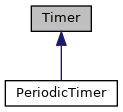 |
1.12 |
 |
1.12 |
Basic one shot timer. More...
#include <timer.h>

Public Types | |
| using | RegisterHandle = uint64_t |
| Handle type. | |
| using | TimerCallback = std::function< void()> |
| Timer callback function definition. | |
Public Member Functions | |
| Timer () noexcept | |
| Construct a one-shot timer. | |
| Timer (const Timer &)=delete | |
| Timer (std::chrono::milliseconds duration) noexcept | |
| Construct a one-shot timer with the specified duration. | |
| Timer (Timer &&) | |
| virtual | ~Timer () noexcept |
| void | cancel () |
| Cancel, or stop, the timer. | |
| void | change_duration (std::chrono::milliseconds duration) |
| Change the duration of the timer. | |
| void | clear_handlers () |
| Clear all handlers. | |
| EGT_NODISCARD std::chrono::milliseconds | duration () const |
| Return the current duration of the timer. | |
| EGT_NODISCARD const std::string & | name () const |
| Get the name of the Timer. | |
| void | name (const std::string &name) |
| Set the name of the Timer. | |
| RegisterHandle | on_timeout (TimerCallback callback) |
| Add a handler callback to be called with the timer times out. | |
| Timer & | operator= (const Timer &)=delete |
| Timer & | operator= (Timer &&) |
| void | remove_handler (RegisterHandle handle) |
| Remove an event handler. | |
| EGT_NODISCARD bool | running () const |
| Returns true if the timer is currently running. | |
| virtual void | start () |
| Start the timer. | |
| void | start (std::chrono::milliseconds duration) |
| Start the timer with the specified duration. | |
| EGT_DEPRECATED void | start_with_duration (std::chrono::milliseconds duration) |
| Start the timer with the specified duration. | |
| void | stop () |
| Alias for cancel(). | |
| void | timeout () |
| Called when the timer times out. | |
Protected Types | |
| using | CallbackArray = std::vector< CallbackMeta > |
| Type for array of registered callbacks. | |
Protected Member Functions | |
| void | invoke_handlers () |
| Invoke any registered handlers. | |
Protected Attributes | |
| CallbackArray | m_callbacks |
| Array of registered callbacks. | |
| std::chrono::milliseconds | m_duration {} |
| The duration of the timer. | |
| RegisterHandle | m_handle_counter {0} |
| Counter used to generate unique handles for each callback registration. | |
| std::unique_ptr< TimerImpl > | m_impl |
| std::string | m_name |
| A user defined name for the Timer. | |
| bool | m_running {false} |
| When true, currently running. | |
| asio::steady_timer | m_timer |
| Asio timer object. | |
Basic one shot timer.
This is a timer that will fire once after the specified duration. To handle the timeout, call on_timeout with a callback.
There are two main use cases for this class. One, is you can derive from this class and overload the Timer::timeout() member function.
The other way is to create an instance of this class and connect a handler by calling Timer::on_timeout().
|
protected |
Type for array of registered callbacks.
| using RegisterHandle = uint64_t |
Handle type.
| using TimerCallback = std::function<void()> |
Timer callback function definition.
|
noexcept |
Construct a one-shot timer.
The duration of the timer can be specified when calling start_with_duration() when using this constructor.
|
explicitnoexcept |
Construct a one-shot timer with the specified duration.
|
virtualnoexcept |
| void cancel | ( | ) |
Cancel, or stop, the timer.
| void change_duration | ( | std::chrono::milliseconds | duration | ) |
Change the duration of the timer.
This will stop the timer, change the duration, and restart the timer with the new duration if the timer was already running.
| void clear_handlers | ( | ) |
Clear all handlers.
|
inline |
Return the current duration of the timer.
|
protected |
Invoke any registered handlers.
|
inline |
Get the name of the Timer.
|
inline |
| RegisterHandle on_timeout | ( | TimerCallback | callback | ) |
Add a handler callback to be called with the timer times out.
This function can be called any number of times to add handlers.
| callback | The callback to invoke on event. |
| void remove_handler | ( | RegisterHandle | handle | ) |
Remove an event handler.
| handle | The handle returned from on_timeout(). |
|
inline |
Returns true if the timer is currently running.
|
virtual |
Start the timer.
It is safe to call start() on an already running timer. It will simply reset and start again.
Reimplemented in PeriodicTimer, and PeriodicTimer.
|
inline |
Start the timer with the specified duration.
This overwrites any duration specified previously.
| EGT_DEPRECATED void start_with_duration | ( | std::chrono::milliseconds | duration | ) |
Start the timer with the specified duration.
This overwrites any duration specified previously.
|
inline |
Alias for cancel().
| void timeout | ( | ) |
Called when the timer times out.
This will invoke any callback registered with add_handler(). If you override this you must make sure to call Timer::timeout() or equivalent if you want callbacks to still be called.
|
protected |
Array of registered callbacks.
|
protected |
The duration of the timer.
|
protected |
Counter used to generate unique handles for each callback registration.
|
protected |
|
protected |
A user defined name for the Timer.
|
protected |
When true, currently running.
|
protected |
Asio timer object.